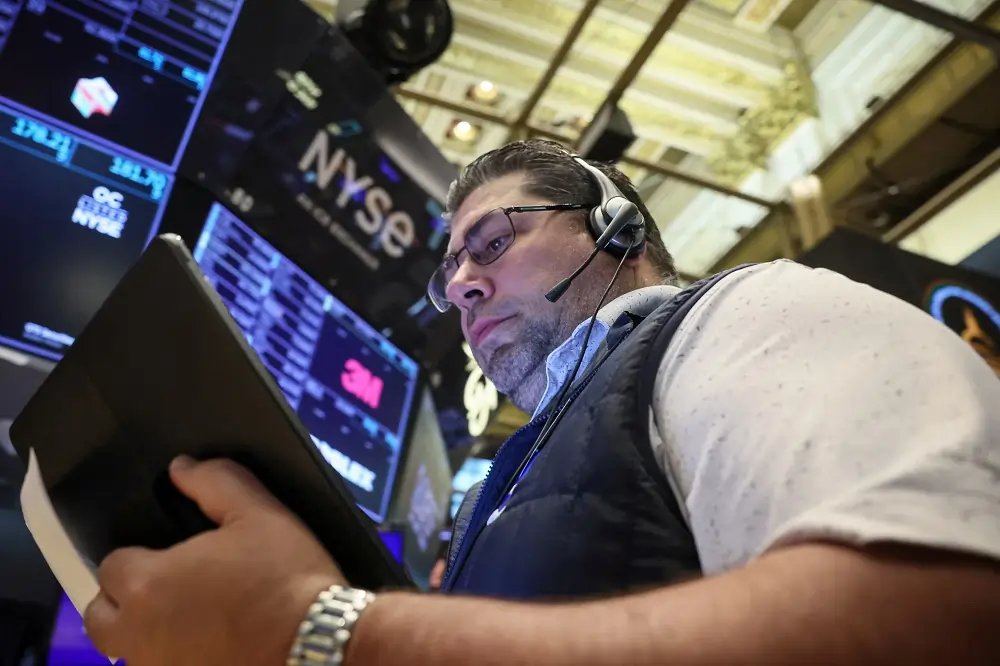Wall St dips and gold surges, capping a tumultuous week


By Stephen Culp
NEW YORK (Reuters) -U.S. stocks dipped and gold surged on Friday at the conclusion of a week fraught with the apparent contradiction of cooling economic data and a hawkish Federal Reserve.
Benchmark U.S. Treasury yields extended their slide, while the dollar gained ground against a basket of world currencies amid geopolitical uncertainties in Europe.
All three major U.S. stock indexes were moderately lower amid a broad sell-off in which economically sensitive industrials and transports fared worst.
For the week, the S&P 500 and the Nasdaq are on track to advance, with the latter lining up its biggest weekly percentage gain since late April.
The Dow looks to be headed to end the week lower than last Friday’s close.
“There’s a lot of cross currents going on,” said Thomas Martin, Senior Portfolio Manager at GLOBALT in Atlanta. “Are we worried about the economy and the Fed or are we taking a breather?”
“We have been at all-time highs and we’re just taking a breather here and adjusting to the new rate cut scenario,” Martin added.
The Fed capped its two-day monetary policy meeting with no change to its key interest rate, as expected. But in its Summary of Economic Projections, the central bank reduced the number of its projected rate cut this year from three to one, striking a more hawkish than expected tone.
The sting was soothed by a series of economic indicators, which showed inflation is cooling faster than analysts projected, which could convince the data-dependent Fed to reconsider the timing and number of cuts this year.
Cleveland Fed President Loretta Mester called the recent cooling inflation data “welcome,” in the wake of the week’s CPI and PPI reports, which came in below analyst expectations.
The Dow Jones Industrial Average fell 241.2 points, or 0.62%, to 38,405.9, the S&P 500 lost 20.22 points, or 0.37%, to 5,413.52 and the Nasdaq Composite dropped 13.28 points, or 0.08%, to 17,654.28.
European stocks extended their sell-off and were poised for a weekly loss as risk appetite was dampened by political uncertainties in France.
The pan-European STOXX 600 index lost 1.09% and MSCI’s gauge of stocks across the globe shed 0.58%.
Emerging market stocks lost 0.03%. MSCI’s broadest index of Asia-Pacific shares outside Japan closed 0.25% lower, while Japan’s Nikkei rose 0.24%.
The dollar advanced as the euro was dragged lower by political uncertainties in France as well as jitters related to Beijing’s expected response to the European Union’s tariff on Chinese electric vehicles.
The yen recovered after the Bank of Japan issued a surprisingly dovish policy update.
The dollar index rose 0.55%, with the euro down 0.52% to $1.0679.
The Japanese yen weakened 0.27% versus the greenback at 157.49 per dollar, while Sterling was last trading at $1.2665, down 0.74% on the day.
U.S. Treasury yields extended their decline, edging down to their lowest level since late March.
Benchmark 10-year notes last rose 8/32 in price to yield 4.2112%, from 4.24% late on Thursday.
The 30-year bond last rose 28/32 in price to yield 4.3506%, from 4.401% late on Thursday.
Oil prices appeared on track for their best week in four months due to solid demand projections.
U.S. crude rose 0.03% to $78.64 per barrel and Brent was last at $82.72, down 0.04% on the day.
Gold prices surged and looked to be headed for its first weekly gain in four.
“There’s a lot of geopolitical uncertainty. Gold is the stable money and a lot of central banks have been stocking up,” Martin said.
Spot gold added 1.2% to $2,330.15 an ounce.
(Reporting by Stephen Culp; Additional Reporting by Elizabeth Howcroft in London; Editing by Toby Chopra)
Wall Street refers to a street in New York City that is the financial district of the United States, housing major financial institutions, stock exchanges, and investment banks.
Monetary policy is the process by which a central bank manages the supply of money and interest rates to achieve specific economic goals, such as controlling inflation and stabilizing currency.
The Federal Reserve, often referred to as the Fed, is the central bank of the United States, responsible for implementing monetary policy and regulating financial institutions.
Inflation is the rate at which the general level of prices for goods and services rises, eroding purchasing power and often measured by the Consumer Price Index (CPI).
A stock index is a measurement of a section of the stock market, calculated from the prices of selected stocks, which serves as a benchmark for market performance.
Explore more articles in the Top Stories category











